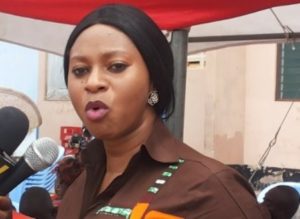Adwoa Safo defends President’s decision to create new ministerial position

Sarah Adwoa Safo, President’s nominee for Minister of State in-charge of Public Procurement has defended the decision of President Akufo-Addo’s government to create the new position.
She said that her responsibility was to advise government on public procurement, adding that she would be an internal check within the administration.
Adwoa Safo made the statement when he appeared before the Appointment Committee of Parliament in Accra.
Ms Adwoa Safo, who is also the Deputy Majority leader is among the last batch of 54 ministers and deputy ministers to be vetted by the Appointment Committee.
Answering questions about a potential clash of roles between her role as Minister in-Charge of Public Procurement and the Public Procurement Authority (PPA), Ms Adjoa Safo stated that there would be no conflict because her ministry would rather empower the PPA.
She emphasised that the government had put in place measures it believed would address the potential abuse of the law through sole-sourcing.
She said government had placed a GH¢50 million ceiling for contracts awarded through sole-sourcing and any cost beyond that level would be brought to cabinet for parliamentary approval.
“I can assure Ghanaians we will minimise the use of sole-sourcing” she added.
Ms Adjoa Safo also stated that, she would help to ensure that government met its campaign promise to reserve 70percent of all taxpayer funded contracts and procurement for local businesses.
She stated that the party’s policy direction to give at least 30 percent the required seven percent of these contracts would be sourced to entities owned by youth, women and people living with disabilities.
Professor Kwesi Yankah, Minister of State in-Charge of Tertiary Education also stated that he would ensure that Public Universities stuck to their core mandate for which they were established.
He explained that many of the Public Universities had evolved over the years and in so doing left behind their original mandate.
The nominee who is also the President of the Central University is expected to bring his vast experience on board in his new portfolio in terms of working in both the Public and Private University environment.
Professor Yankah said there was little differentiation in terms of course content that every university was doing adding that for the university to be able to meet the competition there was the need for it carve a niche for itself.
He said the impression that Private Universities were more expensive was almost a myth in that over the years the gap in fees within private and public universities were narrowing.
He said there were a number of courses in the sciences especially where the Public Universities charged higher than the private ones.
On the three-year or four-year Senior High School (SHS) duration, Professor Yankah stated that his critical analysis of the issue showed that in almost every subject from eight to twenty-five subjects the four year SHS were doing much better across the board.
He said with the exception of certain high schools like the Wesley Girls among others it did not matter whether the duration of SHS was three or four years as they would still score high marks, but the rest of the schools who were in the majority would need more time to perform.
He called for a critical look at the internship system to ensure that they were relevant to small scale businesses.
Professor Yankah said the public over the years believed that the GETFund was setup for only Public Universities rather than all tertiary institutions both public and private.
He said apart from the areas of infrastructure within the Public Universities which was stated in the law, both the public and private universities had the right to access the fund.
Mr Bryn Acheampong, Minister of State at the Office of the President designate who also appeared before the Appointment Committee of Parliament called for Change Management in the deployment of ICT at the ministries, department and agencies.
He urged the Ministry of Communications to play a leading role to ensure that when the Change Management process was undertaken before the deployment.
Source: GNA
